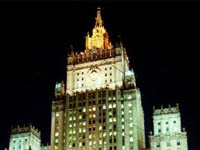Russia exposes true colors of the West
 For the first time in many years, Russia's Foreign Ministry published an extensive report about the state of affairs in the field of human rights in the United States of America, Canada, EU, NATO members and Georgia. The report from the ministry also touched upon Libya, where NATO's incursion has led to the bloody change of power. The document is not flawless. However, it clearly shows that democracy in the West is not as perfect as it is painted.
For the first time in many years, Russia's Foreign Ministry published an extensive report about the state of affairs in the field of human rights in the United States of America, Canada, EU, NATO members and Georgia. The report from the ministry also touched upon Libya, where NATO's incursion has led to the bloody change of power. The document is not flawless. However, it clearly shows that democracy in the West is not as perfect as it is painted.
For a long time the monopoly on the publication of such reports belonged to the United States. The Americans tend to present certain countries as outcasts. Year after year Russia is highlighted in the reports of the State Department. According to them, Russia has issues with the elections, freedom of speech and religious minorities. Something similar is published by the European Union. At one time, Chinese Foreign Ministry published a report on human rights in the United States.
Russian foreign policy was clearly defensive. Russia always had to justify itself, responding to attacks from the West. And then, finally, Russia published a nearly 100-page document describing human rights violations in the United States, Canada, EU and NATO, as well as allied Georgia. The actions of the West during the war in Libya have not been overlooked in the report either. Each region is assigned a separate section.
The largest section is devoted to the U.S. - the country which has declared itself "the standard of democracy." "The situation there is far from the ideals proclaimed by Washington. The main unresolved issue is an odious prison at Guantanamo Bay ... President Obama has legalized indefinite terms without trial... The current administration continues to use most of the methods of social control and interference with the privacy of Americans," the document says.
"There are continued violations of international humanitarian law in armed conflict and during anti-terrorist operations. Chronic systemic problems in the American society are getting more acute, including racial discrimination, xenophobia, overcrowding in jails, unreasonable use of the death penalty ... The U.S. has one of the weakest in the West security systems for workers' rights for Collective Bargaining", stated Russian diplomats.
"The extraterritorial application of the American law does the greatest harm in terms of US-Russian relations. It leads to a violation of fundamental rights and freedoms of Russian citizens, including arbitrary arrests and abductions from third countries (the most obvious examples are the cases of Viktor Bout and K. Yaroshenko)," says the report. The authors also note "a very acute problem of violence against adopted children from Russia in American families."
Further the report lists such things as violation of the rights of prisoners in CIA prisons, the problems with freedom of expression and harassment of employees and the founder of the website WikiLeaks, the death of at least 111,000 Iraqis and 14 thousands of Afghans in the wars unleashed by the United States. There is racial discrimination of blacks and Hispanics, and religious discrimination against American Muslims.
Not everything is well in the U.S. with human rights, freedom of speech and racism, and especially with the wars. Of course, one can parry that in Russia the labor laws are less than perfect, and there are problems with the media, and national relationships are not perfect as well. However, Russia is not instructing the world how to live, and does not throw bombs on other countries. The presence of problems in Russia does not change the fact that the U.S. is far from ideal.
With regard to the European Union, the Russian Foreign Ministry has supported human rights criticism from Human Rights Watch on the rights of immigrants from Asia and Africa and the anti-Muslim rhetoric. "The main conclusion is the overall growth of xenophobia and intolerance in the EU, promotion of far-right rhetoric ... European governments do not try to fight it, but, rather, vice versa, use the trend in domestic purposes," the Russian diplomats said.
"According to the AOHR (EU Agency for Fundamental Human Rights - Ed.) in 2009 more than any others the following nationalities were discriminated at work: North Africans in Italy (30 percent), Roma in Greece (29 percent), Roma in the Czech Republic (27 percent), Africans in Malta (27 percent), Africans in Ireland (26 percent), Roma in Hungary (25 percent), Brazilians in Portugal (24 percent), Turks in Denmark (22 percent), Roma in Poland (22 percent)," the report says.
It is important that Russia described the problem that the EU remained silent about for years. They say that they do not have problems with the Muslims or Roma. They do have them, however, and last year they demonstrated it by the shooting in Norway or the influx of refugees from North Africa. Yet, there is another side to the issue: can Muslims or blacks demand the same rights as the indigenous people? Can they pointedly ignore laws and customs accepted in Europe? Would Roma themselves be willing to adapt to a normal society? Therefore, complaints to the authorities of European countries are still excessive.
Sections on Germany, France, Britain and Sweden, report on the growth of xenophobia and the issues of Muslims. Swedes, among other things, are accused of supporting the Chechen rebels. Finland is also mentioned in connection with the endless stories about taking children away from Russian mothers. In the case of Hungary there is a mention of an attempt to revise the results of the Second World War. Poland, Bulgaria and Romania "only" suffer from inadequate legislation.
A separate section is devoted to the Baltic. "The discriminatory policy of the authorities of the Baltic states against the Russian minority living there remains nearly unchanged. Of particular concern is the unresolved problem of mass statelessness in Latvia (nearly 330 thousand "aliens") and Estonia (nearly 100 thousand "aliens") and consequent violation of the rights of Russian-speaking minorities in these countries," stated the Russian Foreign Ministry.
"Reduction of the Russian-language news and cultural and educational space, as well as the persecution of World War II veterans and law enforcement agencies of the former USSR is also observed in Lithuania. Of particular concern is the continuation of the trend to rewrite the history of the Second World War Baltic states," Russian diplomat said.
Problems in Georgia were very clearly outlined in the report. There are a lot of cases when Russian citizens (including ethnic Georgians) fell victims of provocations of local security forces. Attention is drawn to the dispersal of the protests. Particularly highlighted is the largest violation of the rights of national minorities of the country - the Armenian and Azerbaijani.
"Armenian-populated region of Samtskhe-Javakheti (in Armenian Javakheti) is in dire socio-economic situation ... Administrative positions in local government are occupied predominantly by Georgian. The Georgian authorities have deliberately carried out a discriminatory policy against Azerbaijanis. Resettlement of Azerbaijanis in neighboring Azerbaijan is becoming mass in nature," the Russian diplomats stated.
The next section of the report is on Canada. The country was berated for the brutality against the demonstrators, for the oppression of Indians and Eskimos, and lack of security of Canadian citizens abroad. However, there is not a single word in the report about endless military exercises in the Arctic and threats of Canadian authorities to Russia.
The last section is devoted to NATO operations in Libya. "NATO leaders officially deny the facts of civilian deaths as a result of air strikes by coalition forces, indirect victims, which was the reason for the blockade of the western regions of Libya, the destruction of civilian infrastructure," the diplomat said.
Then follows a list of deaths of civilians from NATO attacks and atrocities of Western-backed rebels. The highlights are "extrajudicial execution of the representatives of the former regime and its supporters with the tacit consent of NATO members," numerous cases of "crimes of the former Libyan armed opposition."
The document is not without drawbacks. Thus, it has no foreword or conclusion. Sections on the United States, the Baltic States, Georgia, Libya, and the largest countries in Europe are very detailed. However, the sections of the smaller European countries, as well as the entire EU and Canada raise questions and seem to be rather "raw". The publication of the report seems untimely. During Christmas and New Year holidays even the politicians are not particularly into policy.
However, the first attempt was pretty good. Russia has shown that it will not always have to justify its behavior after publication of the American and European reports. It can provide pre-emptive strikes in its foreign policy. Hopefully, such reports from the Foreign Ministry of Russia will become commonplace and improve with time.
Vadim Trukhachev
Pravda.Ru
Subscribe to Pravda.Ru Telegram channel, Facebook, RSS!




